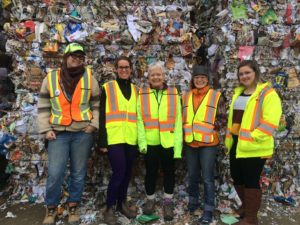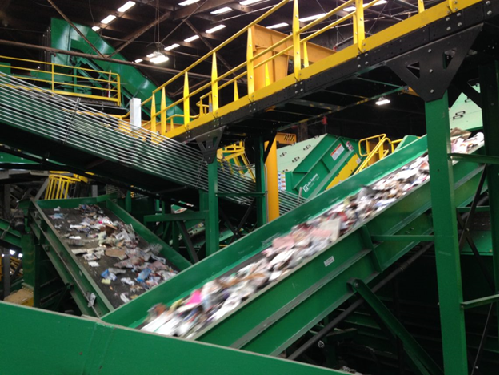The GreenStep team recently had the opportunity to tour Cascades Recovery, a Material Recovery Facility located in Kelowna, British Columbia. Cascades takes mixed recycling from all over the province and sorts it out into individual materials so they can be shipped off to market and be made into something new. What an amazing place! Thanks to our tour guide Steve Fast, Sustainable Materials Manager at Cascades, we learned what we didn’t know we didn’t know about recycling in our region and beyond.
The first thing that stood out was the huge amount of recycling being brought in to the facility from across the Southern Interior of BC (5000 metric tonnes per month, actually). Some of the materials were from curbside collection, some were from commercial customers, and some came directly from big companies, like juice boxes from SunRype. It’s an amazingly busy, intricate, loud, and organized place, with a steady flow of semi-trailers coming in and out of the loading bays all day long. There are 65 staff employed at Cascades Kelowna, and everyone has a role and area to manage for the process to keep flowing smoothly.
Something that surprised us was to learn how big of an impact improperly sorted recycling (or “contamination”) is having on the whole system, especially when you factor in that there are humans on the other end that have to deal with it. You name it – they have seen it; from textiles and garden hoses, to dirty diapers and pots and pans. The staff at Cascades have dealt with it all. Contaminants that pose a significant risk to health and safety (such as needles, sharps, or hazardous materials) result in a full-stop of the conveyor belts so the dangerous items can be safely removed before starting up again; this can really slow down the whole process and decrease efficiency.
It was really cool to see so much diversion happening before our eyes, and we’re so happy these materials aren’t going into the landfill, but the sheer volume of stuff coming in was 100% overwhelming. On a sensory level, listening to the waterfall of cans raining down onto the conveyor belt, the glass bottles being crushed into giant bins, the tin cans being scooped up by magnets, and the forklifts moving skids stacked with TVs was overwhelming but also kind of amazing in a weird way. Taking the tour didn’t necessarily make us want to recycle more (we already do that pretty well), but it definitely made us want to use less. You know, the other R’s – reduce, reuse, refuse, and rethink – before recycling.
With all that in mind, we do have a few recycling tips for you to help the people at Cascades to have a better day…
- Never bag your recycling (it’s better kept loose) – With the exception of shredded paper, which should be in a clear or blue bag.
- Never put loose plastic bags like grocery bags in your recycling either, as they get caught in the conveyer belts and can cause huge backlogs.
- Leave metal can lids attached and bend inwards to contain sharp edges. If detached, place the lid in the bottom of the can then squish the can so the lid won’t fall out. Otherwise small pieces like lids can easily fall through the recycling process and end up in landfill.
- Check out RecycleBC’s pilot program for “Other Flexible Plastic Packaging” that began on June 1, 2018. There is a long list of materials that are now accepted at Return-It depots across BC (check here for participating locations). Don’t place these items in your blue bin; return them to your nearest depot.
- Know your recycling guidelines well (visit the RDCO Waste Reduction Office website), and do NOT put the following items in your blue bin: Styrofoam, plastic bags, glass, textiles, large metal, plastic toys, diapers, pet waste, or hazardous waste. Keep everyone safe and learn to be a recycling hero!
Following the tour, Steve gave us some insight on what happens to various materials after they have been sorted and separated at Cascades. Most materials are shipped overseas for recycling in international markets, and a few may stay in Canada or North America.
“Currently, Cascades Recovery+ has multiple end markets for its recyclables. A majority of CR+ Cardboard is processed and consumed domestically by mills in the Pacific Northwest, where it is pulped and used in the manufacturing of new boxes and boxboard. Mixed paper and office paper follow the same process as Cardboard and, depending on quality, are used to manufacture products such as paper, boxboard and tissue paper. The plastics recycled by CR+ are sent to a local processor in the Lower Mainland where they are sorted, washed, chipped, and melted into pellets and then sold on the open market and used in the manufacturing of new plastic products. Other materials are transported to CR+ Surrey where they are cross docked and loaded into sea cans to be shipped for export overseas. There are many forces that influence the recycling industry and where CR+ is able to send its materials. Factors such as Mill Demand, seasonality, end market legislation changes (i.e. china) and the price of the recyclables all impact the decisions made by CR+ and other organizations in the industry.” – Cascades Recovery+
After seeing how much cleaner the pre-sorted streams were from commercial sources vs. the mixed recycling from residential, we now understand more clearly why China is declining our less than perfect recycling materials, and it gave us a lot to chew on in regards to our own views of recycling and what types of systems would work best to produce the cleanest waste streams possible.
If you haven’t heard already, there have been major changes coming from China over the past year or so that are drastically changing the recycling industry. Their policies are getting stricter on what materials they will accept from international markets, which is causing a huge upset to the current way of recycling in North America, what I like to call “commingled wish-cycling”. This kind of recycling practice mixes it all together and holds little regard for what happens beyond the blue bin; people are addicted to convenience (“What, separate my recycling? That would take too long!”) and don’t take the time to learn and understand their local recycling guidelines (“Can I recycle this?… Who knows, I’ll just throw it in the blue bin anyways”). To complicate matters, recycling policy is set regionally across Canada, resulting in a patchwork mish-mash of systems across the country. This results in vastly different quality of waste streams going abroad, and creates confusion for citizens who move regions and suddenly find they can no longer recycle materials they used to, or that they have to go to a depot versus using curbside collection. Inevitably, this just increases the level of “wish-cycling” behaviour.
This HBO news story video sums it up pretty well; and although it’s focused on the American market, things are pretty similar here in Canada.
The age of convenience has blessed us for a few decades but now it’s coming to bite us in the you-know-what. Commingled recycling, where you place all “recyclable” materials in one bin, is going the way of the dodo. Regional governments, whose jurisdiction includes recycling and waste, are predicting a shift back to source separation, where individuals will once again be responsible to separate streams before recycling. We are not sure exactly what or when changes will come to curbside recycling pick-up, but we are pretty sure they won’t be staying the same for long.
Remember the good old days when we brought all of our recycling to a local depot? I can still remember the dozen or more colourful milk crates lined up in our garage, each one for a different material; newspaper, paper, boxboard, corrugated cardboard, tin cans, and more. On the weekend I’d go with my dad down to the local recycling depot on Hwy 33 to drop it all off, each material in a different bin… Who knows, maybe that’s where my passion for waste reduction started?
As of right now, residential recycling is still business as usual, but changes are starting to trickle down and be felt in the commercial sector. Check out this Kelowna Now news story from September 2018 about a Kelowna business whose waste hauler stopped picking up their commingled recycling and changed to cardboard only. It’s just a matter of time before changes like this trickle down even further to affect everyone; we are about to experience a major change in the way we recycle; in Kelowna, in BC, in Canada, and in the world. I’m staying hopeful that it’ll be for the better.
By: Andrea Mackintosh
Additional Resources
RDCO waste reduction office
www.regionaldistrict.com/your-services/waste-reduction-office.aspx
Recycle BC’s Other Flexible Plastic Packaging pilot program
www.recyclebc.ca/flexiblepackaging
Cascades Recovery
https://recovery.cascades.com/en
Steve Fast, Office: 250-491-2242 ext. 64103, [email protected]
HBO news story: “China’s Waste Ban Is Causing A Trash Crisis In The U.S.”
www.youtube.com/watch?v=NK20t11He14&feature=youtu.be
Kelowna Now news story: Property manager shocked by reduced ‘cardboard only’ recycling service
www.kelownanow.com/watercooler/news/news/Kelowna/Select_residential_recycling_to_be_cut_to_cardboard_only_service
If you would like to know more about the current economic issues in recycling, simply Google search “China – National Sword Policy”.


